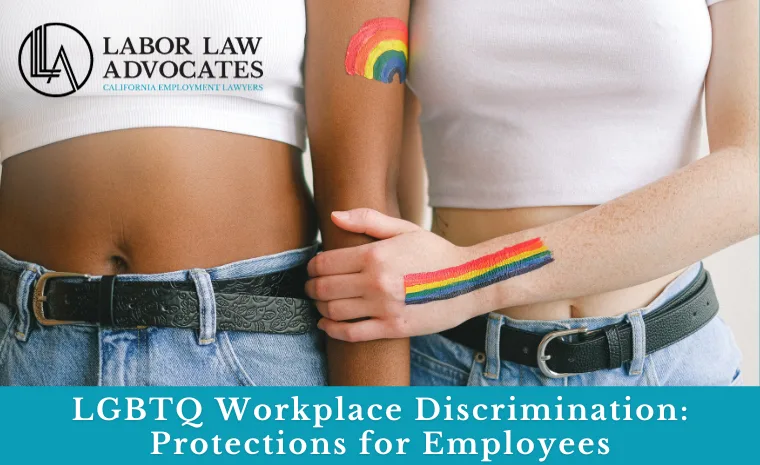In today’s diverse and inclusive society, LGBTQ workplace discrimination remains a pressing issue. LGBTQ employees often face various forms of discrimination, ranging from explicit bias to subtle micro-aggressions. Fortunately, both federal and state laws offer protections to ensure that LGBTQ employees are treated fairly and equitably in California workplaces.
In this blog, we will delve into the various forms of workplace discrimination against LGBTQ employees, discuss the legal protections available in California, and provide guidance on recognizing, reporting, and addressing discrimination.
What Does LGBTQ Stand For?
LGBTQ is an acronym that stands for Lesbian, Gay, Bisexual, Transgender, and Queer (or sometimes Questioning). Each of these terms represents a different aspect of the diverse spectrum of sexual orientations and gender identities.
Each letter in LGBTQ stands for:
- Lesbian: A lesbian is a woman who is romantically, sexually, or emotionally attracted to other women. Lesbian individuals form loving and intimate relationships with women, and their sexual orientation is characterized by this attraction.
- Gay: A gay person is typically a man who is romantically, sexually, or emotionally attracted to other men. However, the term “gay” is often used more broadly to describe all individuals who experience same-sex attractions. It can include both men and women and is a term used to denote a same-sex orientation.
- Bisexual: A bisexual person is someone who experiences attraction to individuals of both their own and different genders. Bisexuality is characterized by the capacity to be romantically and sexually attracted to a diverse range of people, regardless of their gender.
- Transgender: Transgender individuals are those whose gender identity differs from the sex assigned to them at birth. Transgender people may identify as male, female, both, neither, or as a different gender altogether, and they often undertake a journey to align their gender identity with their authentic selves.
- Queer (or Questioning): “Queer” is an inclusive umbrella term that encompasses a variety of non-heteronormative sexual orientations and gender identities. It is often used by individuals whose experiences do not fit neatly into traditional categories like lesbian, gay, or bisexual. “Questioning” refers to individuals who are in the process of exploring or questioning their own sexual orientation or gender identity. They may not have reached a definitive conclusion about how they identify.
These terms reflect the rich diversity of human experiences and orientations when it comes to gender identity and sexual attraction. These terminology and identities continue to evolve, and individuals may use different terms to describe themselves based on their personal experiences and preferences.
Understanding and respecting these identities is essential in creating a more inclusive and accepting society where individuals can express their true selves without fear of discrimination or prejudice.

Forms of LGBTQ Workplace Discrimination
LGBTQ workplace discrimination can take many forms, and it’s essential to recognize and address each one.
These challenges can manifest in several ways:
- Explicit Discrimination: LGBTQ employees may experience explicit forms of anti-LGBTQ discrimination, which can hinder their career advancement and overall job satisfaction.
- Harassment: LGBTQ individuals are at risk of facing verbal, physical, or sexual harassment, which can create a hostile work environment. Such harassment may include derogatory comments, slurs, or offensive sexual jokes.
- Microaggressions: Microaggressions are subtle, often unintentional acts or comments that convey hostility or bias towards LGBTQ individuals. These can include dismissive remarks, stereotyping, or exclusionary behavior.
- Unequal Treatment: LGBTQ employees may encounter disparities in benefits, opportunities, and pay compared to their heterosexual and cisgender counterparts.
- Fear of Disclosure: Some LGBTQ individuals may feel compelled to hide their sexual orientation or gender identity due to fear of discrimination, which can lead to stress and mental health issues.
- Mental Health Impact: Discrimination and harassment can take a toll on the mental health of LGBTQ employees, leading to higher levels of anxiety, psychological distress, and job dissatisfaction.
Experiences of Workplace Discrimination on The LGBTQ Community
According to a UCLA study, the LGBTQ community in the United states still experiences harassment and discriminatory practices. The survey was conducted in May 2021, involving 935 LGBTQ adults who were employed as of March 2020, just before the COVID-19 pandemic and the U.S. Supreme Court’s decision in the Bostock v. Clayton County case.
The key findings include:
- Prevalence of Discrimination: 45.5% of LGBTQ workers reported experiencing unfair treatment at work due to their sexual orientation or gender identity at some point in their lives.
- Ongoing Discrimination: Approximately 31.1% of LGBTQ respondents reported experiencing discrimination or harassment in the five years leading up to the survey.
- Recent Discrimination: Within the past year, 8.9% of employed LGBTQ individuals reported being fired or not hired due to their sexual orientation or gender identity.
- Disparities Among Communities: The percentage of discrimination was higher among LGBTQ employees of color (11.3%) compared to white LGBTQ employees (6.5%). Those who were open about their LGBTQ identity at work were more likely to experience discrimination (10.9%) compared to those who were not open (2.2%).
- Religious Factors: Over half (57.0%) of LGBTQ employees who experienced discrimination or harassment reported that religious beliefs motivated the unfair treatment. This percentage was higher among LGBTQ employees of color (63.5%) compared to white LGBTQ employees (49.4%).
- Coping Mechanisms: Many LGBTQ employees resorted to hiding their LGBTQ identity or altering their physical appearance to avoid discrimination. Some even considered leaving their jobs due to unfair treatment.
This report highlights the persistent and widespread nature of employment discrimination against LGBTQ individuals in the United States, even after legal protections were extended by the Bostock v. Clayton County decision. The findings also underscore the impact of discrimination on the well-being and job satisfaction of LGBTQ employees and the need for continued efforts to promote workplace inclusivity and combat discrimination based on sexual orientation and gender identity.
Are you a job seeker who experienced discrimination because of your gender?
Legal Protections in California
California has a robust legal framework in place to protect LGBTQ employees from workplace discrimination. The goal is to provide equal rights and benefits to their lesbian, gay, bisexual, and transgender employees.
Fair Employment and Housing Act (FEHA)
California’s Fair Employment and Housing Act (FEHA) serves as a cornerstone of LGBTQ workplace protections. FEHA is designed to ensure equal rights and benefits for all employees, including lesbian, gay, bisexual, and transgender individuals. Key points include:
- Prohibition of Discrimination: FEHA explicitly prohibits discrimination based on sexual orientation, gender identity, and transgender status. It encompasses a wide range of discriminatory behaviors, such as hiring practices, promotions, work conditions, and termination decisions.
- Comprehensive Protection: FEHA extends its protection beyond sexual orientation and gender identity to cover various other characteristics, including race, national origin, disability, color, and familial status. This comprehensive approach aims to create a workplace that values diversity and inclusion.
- Employer Coverage: FEHA applies to employers with five or more employees, making it applicable to a significant portion of California’s workforce. This means that smaller businesses are also required to comply with anti-discrimination laws.
- Legal Remedies: Importantly, FEHA provides legal remedies for victims of discrimination. Individuals who experience discrimination based on their sexual orientation or gender identity can seek redress through legal channels, including filing complaints with the California Department of Fair Employment and Housing (DFEH).
Title VII of the Civil Rights Act
In addition to state-level protections, federal law plays a crucial role in safeguarding the rights of LGBTQ employees in California. Title VII of the Civil Rights Act of 1964, a federal law, also addresses workplace discrimination. Key points are:
- Prohibition of Sex-Based Discrimination: Title VII explicitly prohibits discrimination based on sex. This provision has been interpreted by courts to include protections against discrimination based on sexual orientation and gender identity. Therefore, Title VII provides an additional layer of protection for LGBTQ employees in California.
Local Laws
California’s commitment to LGBTQ workplace equality extends to local levels as well. Some cities and counties in California have implemented their own ordinances to provide further protections to LGBTQ employees. For example:
- San Francisco: San Francisco has a Gender Inclusion Policy that offers additional safeguards against discrimination based on sexual orientation and gender identity. This local law reinforces the state and federal protections already in place.
- Los Angeles: Likewise, Los Angeles has its own ordinances to protect LGBTQ employees from discrimination, ensuring that the city’s workforce benefits from an even greater level of inclusivity and fairness.
These local laws complement the state and federal protections, creating a comprehensive network of legal measures designed to ensure that LGBTQ employees in California can work in environments free from discrimination and bias, where their rights and dignity are respected.
Recognizing and Addressing Discrimination
To combat LGBTQ workplace discrimination effectively, it’s crucial to recognize the signs and take appropriate action:
- Be Aware: Pay attention to any derogatory comments, exclusionary behavior, or disparities in treatment. These may be indicative of gender identity discrimination.
- Document Incidents: Keep a record of any discriminatory incidents, including dates, times, locations, and individuals involved. This documentation can be invaluable if you decide to take legal action.
- Report to HR or Management: If you experience discrimination, report it to your employer’s human resources department or management. Employers have a legal obligation to address workplace discrimination promptly.
What to Do if Your Rights Are Violated
If your rights as an LGBTQ employee in California are violated, you have several options:
- Consult an Attorney: Seek legal counsel from an attorney experienced in employment discrimination cases. They can help you navigate the legal process and protect your rights.
- File a Complaint: You can file a complaint with the California Department of Fair Employment and Housing (DFEH) or the U.S. Equal Employment Opportunity Commission (EEOC) if the discrimination violates state or federal laws.
- Consider Mediation: Mediation can be an alternative to litigation, allowing you and your employer to resolve the dispute through negotiation with the assistance of a neutral mediator.
- LGBTQ Employee Resource Groups: Many organizations have LGBTQ Employee Resource Groups (ERGs) that provide support, resources, and a sense of community for LGBTQ employees. Joining such groups can be empowering and help combat discrimination collectively.
- Diversity and Inclusion Training: Employers can benefit from implementing diversity and inclusion training programs to educate employees about LGBTQ issues and create a more inclusive work environment.
- Allies and Advocates: Allies play a crucial role in supporting LGBTQ employees. Encourage colleagues and supervisors to be allies and speak out against discrimination when they witness it.
- Mental Health Support: Discrimination can have a profound impact on an individual’s mental health. It’s essential to seek gender-affirming care, particularly mental health support if you’re experiencing stress or anxiety due to workplace discrimination.
- Stay Informed: Employment laws and regulations can change, so it’s important to stay informed about any updates in LGBTQ workplace protections in California. Follow developments in the legal landscape to ensure you are aware of your rights.
Conclusion
LGBTQ workplace discrimination is an issue that should not be tolerated. California offers strong legal protections to ensure that LGBTQ employees can work in an environment free from discrimination.
By recognizing the forms of discrimination, knowing your rights, and taking appropriate action, employees can help combat discrimination and promote inclusivity in the workplace. Remember that seeking legal advice and assistance is essential if your rights are violated, as the law is on your side in California.
Remember, fostering an environment where all individuals can bring their authentic selves to work without fear of discrimination is vital. Any organization or community can benefit from the diverse perspectives and amazing talents of their LGBTQ workforce while creating a more equitable and supportive workplace for everyone.




